What is Local Search Engine Optimization (SEO)?
Local SEO
Local SEO is all about making sure your business pops up when people nearby are searching for what you offer on Google and other search engines. It's like waving a friendly flag to let locals know you're there. It involves a bunch of tactics to make your business stand out in local search results. This is especially important for potential customers looking for services or products in their area.
Google's search engine scans through websites, cataloging their content, deciding which ones best match what someone's looking for. It's like a super-smart librarian organizing books so you can find the perfect one quickly.
When your local business utilizes SEO, by tweaking your online presence—including optimizing your Google Business Profile (GBP) and website—- it becomes more likely that Google will recommend your business when people in your area search for your product or service. Getting good reviews and making sure your business details including location, contact info. and descriptions of your products or services, is consistent across the web also helps. It shows Google you're a legitimate business, making meaningful connections with people nearby showing Google you're a vibrant part of your neighborhood.

7 Reasons Why You Can't Afford to Ignore Local Search Engine Optimization
- Increased Visibility: 75% of users never scroll past the first page of search results, meaning if you’re not there, you’re nearly invisible (Chitika). Showing up on the first page of search results, ideally at the top or second position is optimal for user response.
- High Return On Investment (ROI): SEO leads have a 14.6% close rate, compared to just 1.7% for outbound leads like cold calls (Search Engine Journal). With the overwhelming majority of people finding business online through their mobile or desktop device, making sure your business ranks well in these results is paramount.
- Cost-Effective: SEO is 61% less expensive per lead than traditional outbound marketing like cold-calling, radio ads, billboard ads, etc… (HubSpot).
- Mobile Searches: 78% of local mobile searches result in the purchase of goods or services from a local business. (Google).
- Builds Trust: 87% of consumers read online reviews. Businesses with strong SEO are more likely to be trusted (BrightLocal).
6. Long-Term Success: Unlike paid ads, SEO efforts build over time, providing sustainable results without ongoing costs. - Competitor Advantage: 61% of marketers say improving SEO is their top inbound marketing priority. Not utilizing this powerful tool means your business will fall behind your competitors. (HubSpot).
- Local Impact: 46% of all Google searches are looking for local information, so optimizing locally can drive significant traffic to your business (GoGulf).
Now you know WHY Local SEO is important, but that’s just the first step. Now, it’s important to know HOW Google and other search engines determine your search result status compared to and against that of your competitors.
Here are a few key factors Google takes into consideration when ranking your business in an online search.
- Having a fully optimized Google Business Profile (GBP): Google Business Profile is a tool allowing businesses to manage their online presence on Google. It contains a wealth of information for local internet users including contact info, location, photos, reviews and much more. Essentially, your GBP is your digital storefront: The first interaction a potential customer has with your business. When it comes to boosting your local Google ranking, a few key factors make all the difference. The biggest player is your Google Business Profile (GBP) signals, which make up 32% of your local Google ranking.
- Website Content Relevance (Matching Search Intent): Google matches your website’s content to the search query. The more relevant keywords and phrases you use, the higher the probability that Google will rank your site. Think of it like matching pairs: the closer the match, the higher the score.Quality Content (Page Authority): Content quality is like points in a game. The more high-quality, informative content you have, the more "points" you earn, boosting your page authority and ranking. Google also considers factors like word count, keyword usage, and user engagement (e.g., time spent on the page).
- Backlinks (Referral Points): Backlinks are like votes. If other reputable sites link to your page, it's like earning votes of confidence. The more quality backlinks you have, the more your "score" increases, making Google see your site as more authoritative.
- Mobile-Friendliness (Accessibility Score):</strong< Google checks if your site is mobile-friendly. If your site passes, you score higher. With mobile searches accounting for over 60% of all searches, this factor significantly impacts your ranking.
- Page Load Speed (Efficiency Score): Faster websites score better. Google penalizes slow-loading sites because they offer a poor user experience. A one-second delay in page load can reduce conversions by 7%, affecting your ranking.
- Local Signals (Proximity Score): For local searches, proximity plays a big role. Google calculates how close your business is to the searcher’s location. The closer you are, the higher your proximity score, which boosts your ranking in local searches.
- User Experience (Engagement Rate): Google measures how users interact with your site—things like bounce rate, click-through rate, and time on site. High engagement scores signal a positive user experience, which Google rewards with higher rankings.
- Consistency (Citations and NAP): Your business name, address, and phone number (NAP) need to be consistent across all online platforms. Inconsistent NAP information can confuse Google’s algorithms, leading to a lower "accuracy score" and ranking.
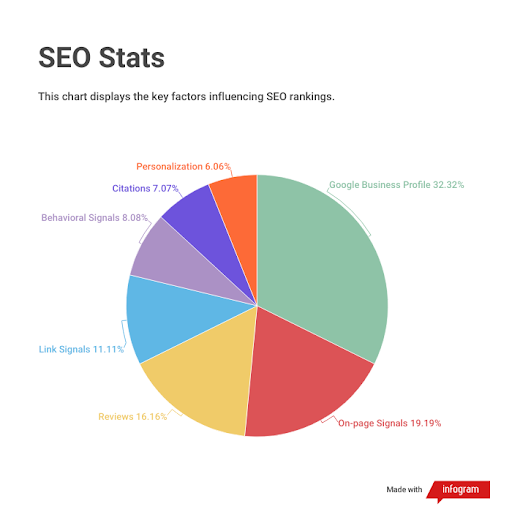
Now it’s time to get down to brass tacks!
Here are 11 digital marketing tactics to optimize to improve Local SEO
1. Optimize your Google Business Profile
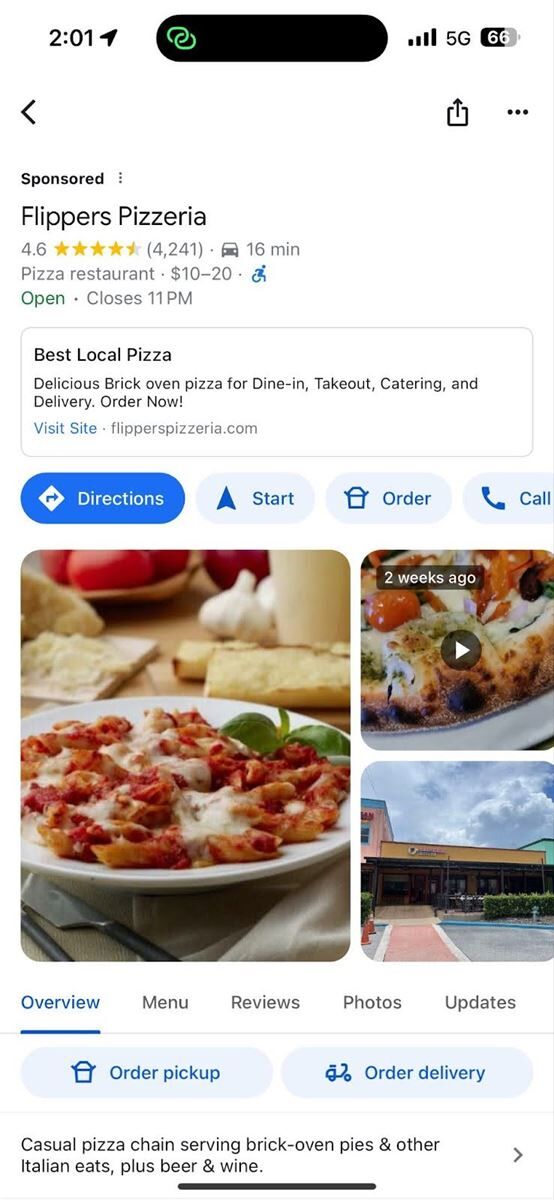 a. Claim and Verify Your Google Business Profile - Verified businesses are twice as likely to be seen as reputable. Google needs a real person to claim the profile and follow specific guidelines.
a. Claim and Verify Your Google Business Profile - Verified businesses are twice as likely to be seen as reputable. Google needs a real person to claim the profile and follow specific guidelines.
b. Remove Duplicate Profiles - Keep your GBP well-maintained and up-to-date. Ensure your business details (name, address, phone number, hours) are consistent across all platforms like Yelp and Facebook. Duplicate profiles can hurt your ranking, so find and resolve them ASAP following Google’s guidelines.
c. Keep Your GBP Updated - Your GBP should be updated frequently. Without regular checks, it could change every five days due to user modifications. Ensure any errors are fixed as soon as possible.
d. Add Visuals for More Clicks - GBPs with 100 photos get 2,717% more direction requests. Profiles with just one photo get 75% fewer direction requests. Consumers love seeing the products and destinations they are visiting. Follow Google's picture and video guidelines for best results. By keeping your GBP up-to-date and full of relevant info, you'll improve your search ranking and attract more customers!
2. Optimize Local Citations
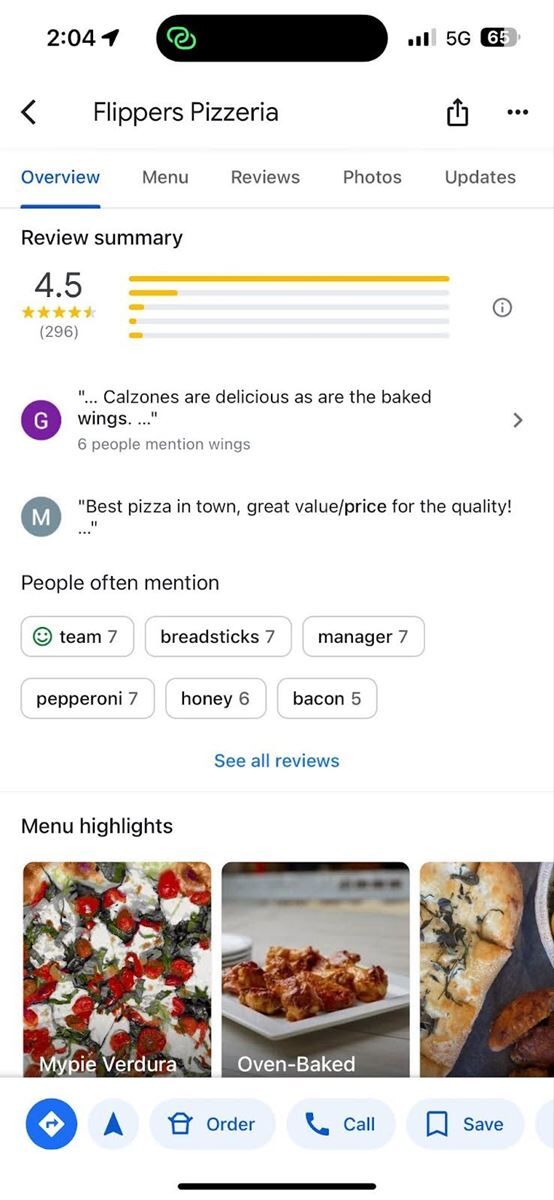
Local citations are like the heartbeat of your business's online presence—a network of digital signals that whisper to search engines about your authenticity and reliability. Imagine them as breadcrumbs scattered across the vast digital landscape, guiding potential customers straight to your door.
Ensuring your business is not just listed, but listed accurately and consistently across a myriad of online directories such as Yelp, Yellow Pages, and local business directories, is akin to laying down a solid foundation for trust. It's about more than just ticking boxes; it's about crafting a digital footprint that echoes your commitment to excellence.
Think of each citation as a digital handshake—a chance to introduce your business to a whole new audience. When your business details—like your name, address, phone number, and website—are meticulously aligned across these platforms, search engines take notice. They see a business that cares about its online presence and, in turn, reward it with higher rankings in search results.
But it's not just about visibility; it's about nurturing relationships. Personalize each listing with vibrant descriptions that reflect your unique story and mission. Share insights, anecdotes, and customer testimonials that resonate with local communities. Show them why your business isn't just another listing but a cornerstone of their neighborhood.
By harnessing the power of local citations, you're not just boosting your SEO; you're weaving a digital tapestry that connects you with customers on a deeper level. So, take the time to cultivate and curate these citations—they're more than directories; they're your digital ambassadors, spreading the word about your business far and wide.
3. Localize all mentions of your business online, eg. Yelp, GBP, your website, etc…
When searching for your business, people type in keywords that are relevant to the goods or services you provide. Keyword research is an essential part of optimizing your local SEO. Use tools like ChatGBT, Google’s keyword planner to determine which keywords are right for your business. If you operate a pizza restaurant in Portland, Maine - you’ll probably want to include terms like “best pizza in Portland” on your GBP, Yelp and website.
There’s often no better place to get ideas for keywords than your competitors’ blogs, websites, and social media for meta descriptions and keywords. Spend time reviewing your competitor’s websites, Yelp review and Google Business Profile to get more ideas on improving your own online presence.
Explore Google Maps and local listings as well as doing a google search on your web browser using words that describe your business type can yield results which can inform you on necessary terms, words and media which can help your business rank higher in your category. Another great tool is to check out the “people also search for” section on Google Maps.
4. Optimize On-Page SEO
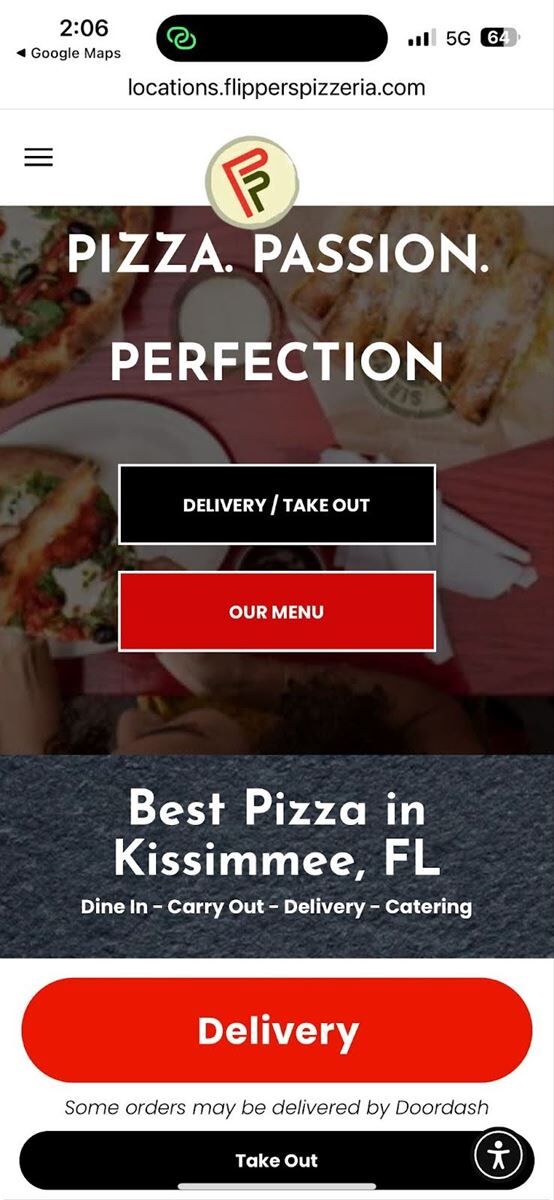
On-page SEO isn't just about tweaking words on a webpage; it's about crafting a digital narrative that speaks directly to your local audience. Imagine your website as a vibrant hub where every word, every tag, and every pixel is strategically placed to resonate with potential customers searching for the best of what your city offers.
Start by infusing your website with local keywords that sing the praises of your business—think "best pizza in Seattle" or "top-rated HVAC repair in Tampa." Keywords and terms are invitations for locals to discover what makes your offerings uniquely irresistible.
But don't stop there. Dive deeper into the essence of your city and region by weaving these names into your website meta tags and headers, as well as including them throughout the content on your site. Each page on your website will tell a story that's not just about your business but also about your deep-rooted connection to the community. Whether it's through captivating blog posts about local events, stories, or even interviews with local influencers, each piece of content becomes a beacon that draws in both search engines and potential customers alike.
Consider creating dedicated location-specific pages or blog posts that celebrate the flavors, sights, and sounds of your neighborhood. Showcase customer testimonials from locals who swear by your services, or highlight community initiatives you're proud to support. This personal touch not only boosts your SEO rankings but also builds a bond of trust with your audience.
Remember, on-page SEO isn't a one-time task—it's an ongoing dialogue between your business and the digital world. By continuously refining and enriching your website with local insights and genuine stories, you're not just optimizing for search engines; you're creating a virtual doorway that welcomes locals to experience the best your business has to offer. So, embrace the power of on-page SEO as a canvas to paint your business's vibrant story across every digital corner of your community.
5. Focus on Reviews and Ratings
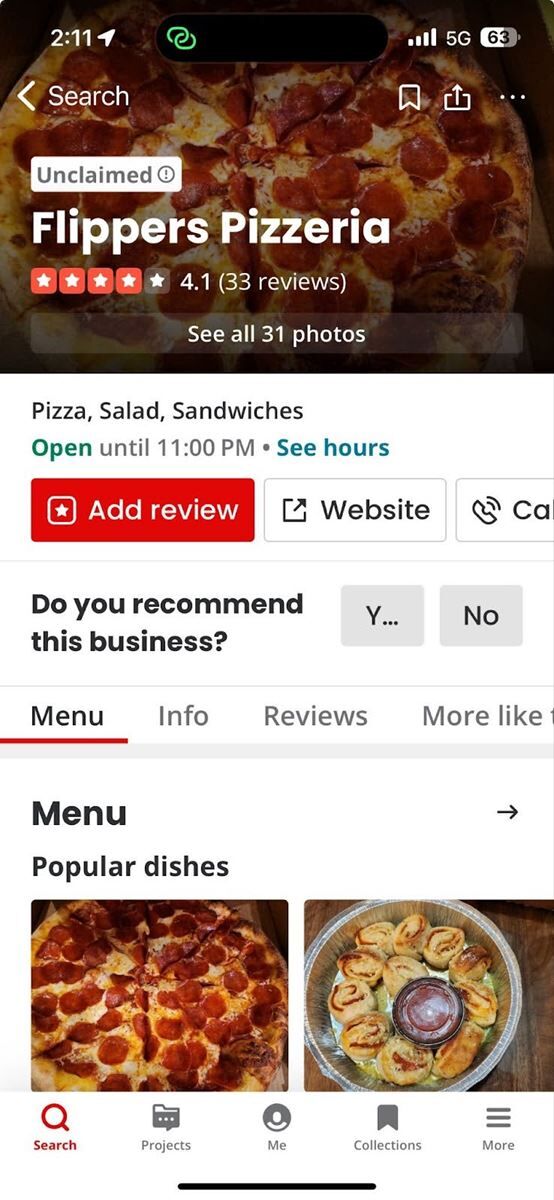
Reviews and ratings are the heartbeat of your business's online reputation—a symphony of customer voices that resonate across the digital landscape. Imagine each review as a personal endorsement, a testament to the exceptional experiences your business provides. Encouraging satisfied customers to share their thoughts not only amplifies your credibility but also strengthens your connection with the community.
Start by nurturing a culture of feedback among your customers. Invite them to share their experiences on platforms like Google, Yelp, and social media review sites. A simple request for a review can often lead to a cascade of heartfelt testimonials that speak volumes about your dedication to customer satisfaction.
But it's not just about gathering praise; it's about engaging with each review, whether positive or negative. Responding promptly and thoughtfully shows that you value every customer's voice and are committed to making their experience exceptional. Celebrate positive reviews with gratitude and humility, acknowledging the effort customers took to share their joy.
When it comes to negative reviews, view them as opportunities rather than setbacks. Responding empathetically and addressing concerns publicly demonstrates transparency and a proactive approach to customer care. It's a chance to turn a dissatisfied customer into a loyal advocate by resolving issues and showcasing your commitment to continuous improvement.
Consider going beyond mere responses—use reviews as inspiration for growth. Highlight customer stories and feedback on your website or social media, showcasing real-life examples of how your business impacts lives. Share success stories and testimonials to inspire confidence in potential customers browsing your reviews.
Ultimately, reviews and ratings are more than just metrics; they're reflections of your business's soul. Embrace them as conversations that shape your reputation and foster trust within your community. By actively engaging with reviews and leveraging them to showcase your commitment to excellence, you're not just building a brand—you're cultivating a legacy of exceptional customer care and community pride.
Tips for getting customers to leave reviews
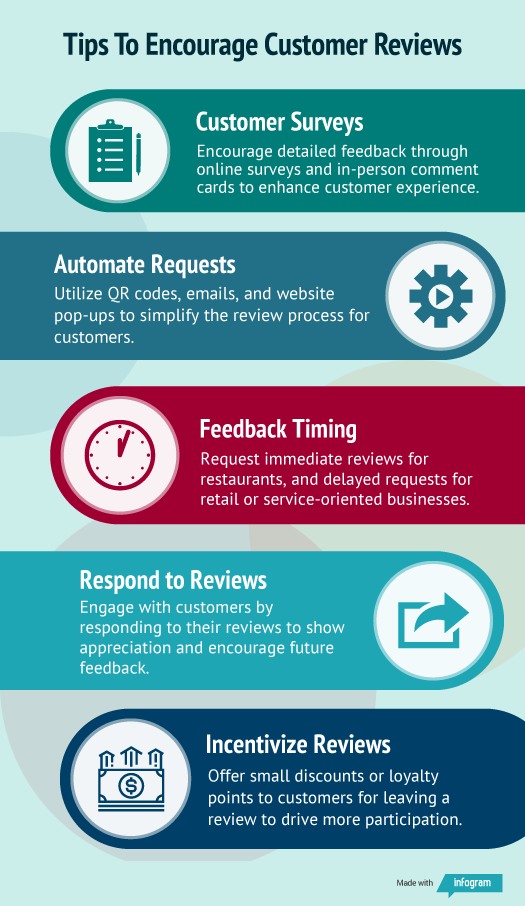 To boost online reviews and enhance the visibility of your local listings, start by surveying customers. This allows them to voice their opinions, and their detailed feedback often includes keywords relevant to your business, improving local SEO. Next, automate and personalize review requests using QR codes, emails, or website pop-ups. Referencing the specific product or service makes the request feel more personal and prompts customers to provide targeted feedback.
To boost online reviews and enhance the visibility of your local listings, start by surveying customers. This allows them to voice their opinions, and their detailed feedback often includes keywords relevant to your business, improving local SEO. Next, automate and personalize review requests using QR codes, emails, or website pop-ups. Referencing the specific product or service makes the request feel more personal and prompts customers to provide targeted feedback.
Reinforce the ideal customer experience in your review requests by outlining what the experience should entail and asking specific questions to guide their responses. Timing is also crucial; adjust your feedback requests based on your business type, such as immediate feedback for restaurants or a delayed request for retail stores. Lastly, actively engage with existing reviews by responding to them. This not only builds trust but also positively impacts local search engine optimization, as Google rewards businesses that are engaged with their customer reviews. An additional tip for incentivizing reviews, offer discounts or loyalty points for leaving a review.
6. Mobile Optimization is Paramount
Mobile optimization isn't just a checkbox—it's about crafting a seamless digital experience that meets your customers wherever they are, whenever they need you. Picture your business's website as a virtual storefront that opens effortlessly on smartphones and tablets, inviting potential customers to explore your offerings with ease.
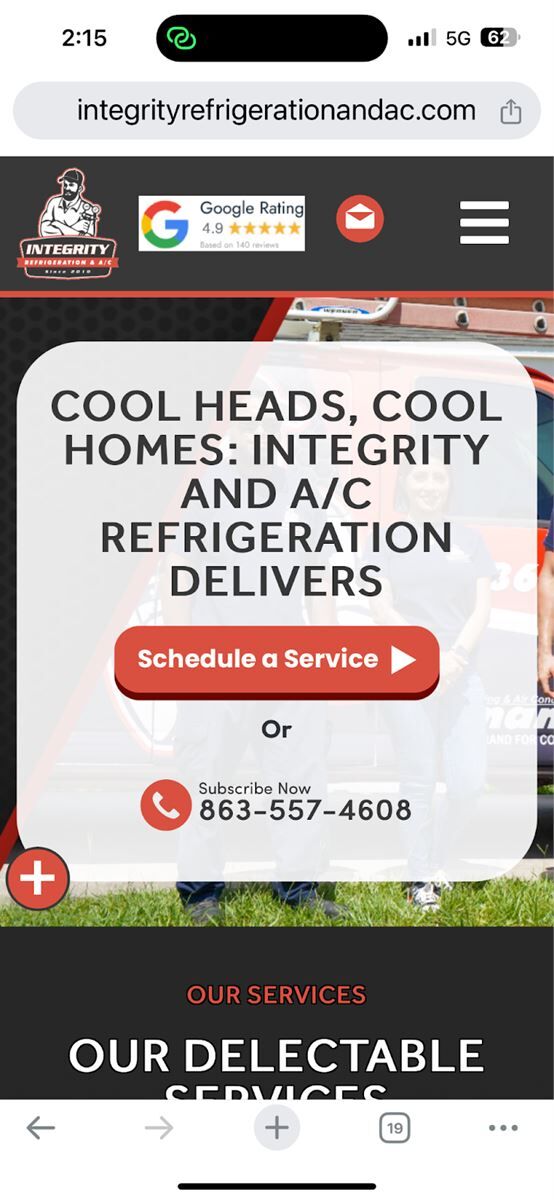
In today's digital age, where smartphones have become extensions of ourselves, ensuring your website is not just mobile-friendly but optimized for mobile devices is crucial. It's about more than just adapting to screen sizes; it's about creating a responsive design that adapts fluidly to the touch and swipe of a fingertip. Imagine your website as a dynamic canvas where every image loads quickly, every button is easily clickable, and every piece of content flows intuitively.
But mobile optimization is also about understanding your customers' journey. It's about anticipating their needs in those micro-moments when they search for local services or products on their phones. By optimizing your website for mobile, you're not just meeting expectations; you're exceeding them. You're ensuring that potential customers find what they're looking for effortlessly, whether they're searching for your business on a bustling city street or relaxing at home.
Personalize the mobile experience by incorporating features like click-to-call buttons for instant connections, location-based services that guide customers to your doorstep, and mobile-friendly forms that streamline inquiries and bookings. Consider integrating mobile-specific content that speaks directly to on-the-go consumers—think quick guides, local insights, and exclusive mobile offers that capture attention and drive engagement.
Think of mobile optimization as a promise—a commitment to delivering a seamless experience that reflects your business's dedication to customer convenience and satisfaction. By embracing mobile-friendly design and functionality, you're not just optimizing for screens; you're optimizing for connections. You're creating a digital pathway that leads straight to your business's success, one mobile-friendly interaction at a time.
7. Local Backlinks
Local backlinks are like threads that weave your business into the fabric of your community's online presence—a web of connections that not only boost your visibility but also strengthen your local SEO foundation. Imagine each backlink as a digital endorsement, a nod of approval from fellow businesses, local newspapers, blogs, and community sites that recognize your value and expertise.
Building a network of local backlinks isn't just about SEO; it's about forging meaningful partnerships and fostering genuine connections within your community. Start by reaching out to neighboring businesses and complementary services. Collaborate on projects, share each other's content, and link back to each other's websites. These partnerships not only enhance your online authority but also expand your reach to new audiences who trust the recommendations of local businesses they know and love.
Consider pitching your expertise to local newspapers and blogs. Share your insights, success stories, and community involvement. When these publications link back to your website, it not only boosts your credibility as a thought leader but also drives traffic from readers eager to learn more about your contributions to the community.
Engage with community sites and forums where locals gather to discuss topics relevant to your industry. Contribute valuable insights, answer questions, and participate in discussions authentically. When you establish yourself as a trusted voice in these communities, other members are more likely to link to your website as a valuable resource.
Personalize your approach by showcasing your business's unique story and commitment to your community. Share testimonials from satisfied customers and highlight your involvement in local events, charities, or initiatives. These authentic narratives not only attract backlinks but also resonate deeply with potential customers who value businesses that are ingrained in their community's fabric.
Remember, acquiring local backlinks is a journey of relationship-building and mutual support. By cultivating genuine connections, offering value to your community, and demonstrating your expertise through partnerships and contributions, you're not just improving your local search rankings—you're becoming an integral part of the digital tapestry that defines your community's online identity.
8. Leverage Social Media to increase Local SEO

Local SEO and social media engagement are two interconnected strategies that, when combined, can drive substantial growth for your business. Local SEO ensures that your business ranks highly in search results when potential customers in your area are looking for the services you offer, making it easier for them to find and visit you. Social media engagement, on the other hand, fosters direct interaction with your audience, allowing you to build relationships, share valuable content, and respond to customer needs in real-time. By actively engaging on social platforms, you not only increase traffic to your website but also boost your local SEO through improved brand visibility, customer reviews, and social signals that search engines take into account. Together, these strategies create a robust online presence that makes your business more discoverable, credible, and trusted in your local market, ensuring that you not only attract new customers but also retain their loyalty.
Social Media Engagement:
“81% of users report that social media increases accountability for businesses.”
Social media engagement is about sparking conversations, building relationships, and creating a vibrant digital presence that resonates with your local community. Imagine your social media profiles as virtual gathering places where customers, neighbors, and enthusiasts gather to share stories, seek advice, and discover what makes your business unique.
Start by cultivating a dynamic presence on platforms like Facebook, Instagram, Twitter, and LinkedIn. Regularly share compelling content that showcases your business's personality, values, and offerings. Whether it's behind-the-scenes glimpses, customer testimonials, or tips and tricks related to your industry, each post is an opportunity to engage authentically with your audience.
It's about fostering two-way communication. Respond promptly to comments, messages, and reviews. Acknowledge praise with gratitude and humility, and address concerns with empathy and transparency. By actively listening and engaging, you demonstrate your commitment to customer satisfaction and build trust within your community.
Go beyond promotional content by actively participating in local conversations and events. Share news about community happenings, support local initiatives, and celebrate milestones that matter to your neighbors. When you become a part of the local social fabric, your audience sees your business not just as a service provider but as a valued member of their community.
Personalize your approach by highlighting the faces behind your business. Introduce your team, share their stories, and showcase their expertise. Humanize your brand by sharing the passion and dedication that drive your business forward. Encourage team members to engage authentically on social media, sharing their perspectives and interacting with followers as ambassadors of your brand.
Consider leveraging user-generated content by encouraging customers to share their experiences with your products or services. Feature their photos, testimonials, and stories on your social media channels, giving them a platform to shine while showcasing real-life examples of your business's impact.
By nurturing a robust social media presence and actively engaging with your local community, you're not just driving traffic to your website and improving local SEO—you're building a loyal following of advocates who champion your brand, share your story, and contribute to your business's ongoing success. Embrace social media as a powerful tool for connection and community building, and watch as your digital presence flourishes alongside your business's growth.
Local SEO isn't a one-size-fits-all approach—it's a personalized strategy that tailors your digital footprint to match the unique needs and preferences of your community. Consider creating location-specific landing pages that highlight the distinct offerings of each of your business locations or service areas. Share local success stories, customer testimonials, and community involvement initiatives that showcase your commitment to enriching the neighborhoods you serve.
Engage with local directories, review sites, and social media platforms to amplify your presence within your community. Encourage satisfied customers to leave reviews and ratings, which not only enhance your credibility but also improve your local SEO rankings. Respond thoughtfully to reviews, both positive and negative, demonstrating your dedication to customer satisfaction and continuous improvement.
9. Targeted Traffic
Consider leveraging geo-targeted advertising campaigns on platforms like Google Ads, Facebook, and Instagram. These campaigns allow you to reach potential customers based on their location, ensuring that your marketing messages are delivered to those who are physically near your business and likely to make a purchase.
Build trust and credibility by actively participating in local forums, groups, and social media communities. Answer questions, provide valuable insights, and offer solutions to common challenges faced by local residents. By positioning yourself as a knowledgeable and trustworthy authority within your community, you not only attract targeted traffic to your website but also foster long-term relationships that drive repeat business and referrals.
10. Enhanced Reputation
Enhancing your business's reputation goes beyond just delivering great products or services—it's about cultivating trust, building relationships, and becoming a pillar of reliability within your community. Imagine your reputation as a tapestry woven from every positive interaction, review, and community engagement, reflecting the values and commitment that define your business.
Positive reviews are more than just feedback—they're testimonials that validate your business's excellence and credibility. Encouraging satisfied customers to share their experiences on platforms like Google, Yelp, and social media not only boosts your online reputation but also strengthens the trust of potential customers who rely on these reviews to guide their purchasing decisions.
But reputation-building is a holistic journey that extends beyond reviews. It's about nurturing a strong local presence that resonates with your community's values and aspirations. Start by actively engaging with local customers through social media, community events, and partnerships. Show genuine interest in their needs and concerns, and demonstrate your commitment to delivering exceptional service and support.
Consider showcasing your business's involvement in local initiatives, sponsorships, or charitable efforts. By demonstrating your dedication to giving back to the community, you not only enhance your reputation as a responsible corporate citizen but also earn the respect and loyalty of local residents who value businesses that contribute positively to society.
Personalize your approach by sharing stories and insights that highlight your business's unique journey and the people behind your success. Introduce your team members, share their passion for what they do, and celebrate their contributions to your business's growth and reputation. By humanizing your brand and showcasing the faces and stories behind your success, you create a connection that goes beyond transactions—it builds lasting relationships based on trust and mutual respect.
Respond thoughtfully to both positive and negative feedback, addressing concerns with empathy and transparency. Use constructive criticism as an opportunity for growth and improvement, demonstrating your commitment to continuously enhancing the customer experience.
11. Competitive Advantage
Competing effectively in today's market isn't about size—it's about strategy, authenticity, and connecting deeply with your local community. Small businesses have a unique opportunity to carve out their niche and thrive by harnessing the power of local SEO strategies tailored to their specific market.
Imagine local SEO as your secret weapon—a toolkit of digital strategies that empowers you to stand out against larger national brands. By optimizing your website, content, and online presence for local searches, you're not just leveling the playing field; you're amplifying your strengths and differentiating yourself in ways that resonate deeply with your target audience.
Start by understanding the pulse of your local market—what are the unique needs, preferences, and challenges of your community? Tailor your SEO efforts with localized keywords, ensuring that your website and content reflect the specific products, services, and benefits that matter most to local customers. By speaking their language and addressing their concerns directly, you position your business as a trusted ally and preferred choice.
Local SEO is a non-negotiable for businesses if you want to maintain an advantage over your competitors. Local search results are by far the most frequently used avenue for new customers to find your business making it an essential part of a successful marketing strategy.
To summarize, we’ve boiled down the 3 the overwhelming benefits of Local SEO
1. Cost-Effectiveness
- Lower Advertising Costs: Local SEO focuses on organic search, which means the traffic generated through these efforts doesn't require ongoing ad spend like pay-per-click (PPC) campaigns. A study by HubSpot found that companies with a solid SEO strategy in place typically see 61% lower cost per lead compared to outbound marketing tactics like cold calling and direct mail .
- High ROI on Content Marketing: Local SEO often involves creating and optimizing content for specific regions. According to the Content Marketing Institute, content marketing generates over three times as many leads as outbound marketing and costs 62% less .
2. High Return Rate
- Increased Conversion Rates: Businesses that optimize for local search see higher conversion rates. According to a report by Google, 76% of people who search for something nearby on their smartphones visit a related business within a day, and 28% of those searches result in a purchase .
- Enhanced Online Visibility: BrightLocal's 2023 Local Consumer Review Survey found that 87% of consumers read online reviews for local businesses, and those businesses with a strong local SEO presence are more likely to be found and trusted by potential customers .
3. Competitive Advantage
- Local Searches Lead to Store Visits: Google reports that “near me” searches have grown by over 500% in the last few years. Businesses that invest in local SEO are more likely to capture these high-intent searches, driving more foot traffic and sales .
- Mobile Search Growth: Statista projects that by 2025, nearly 73% of global internet users will access the web solely via their smartphones, highlighting the importance of local SEO for mobile users .
Search Engine Optimization improves your website’s visibility in search engines, attract more visitors to your website, and generate more leads and sales for your business. SEO can deliver substantial returns on investment and play a vital role in your digital marketing plan. SEO is an ongoing process, so stay data-driven, experiment, and keep optimizing to maximize your success.
The Salem Surround Team helps businesses like yours dominate your local market with SEO. Our team of experts are ready to provide you with the support you need. Contact one of our Media Strategists today.
Sources:
HubSpot: "The Ultimate List of Marketing Statistics for 2023", Content Marketing Institute: "Content Marketing ROI: What You Need to Know", Google: "Understanding Consumers’ Local Search Behavior", BrightLocal: "Local Consumer Review Survey 2023", Statista: "Smartphone Users as a Share of the Global Population”, Moz - Search Engine Ranking Factors, Ahrefs - Backlinks: What They Are and How They Work, Moz - Local Search Ranking Factors, SEMrush - How User Engagement Affects SEO, BrightLocal - Local Citations Guide.

